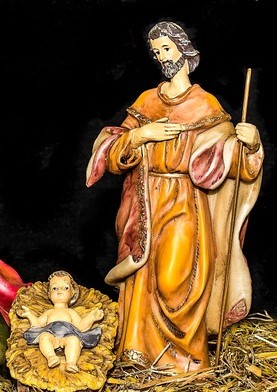One of the primary characters surrounding the events of Jesus’ birth and early life is his stepfather, Joseph. While His mother, Mary, often gets most of the press this time of year, Joseph also played a crucial role in that first Christmas and the years following.
Although we don’t know much about Joseph, he was likely in his late teens for that was the customary age for betrothal and marriage of Jewish men. The couple’s engagement was likely arranged by their parents and they were all surely anticipating the extravagant marriage celebration which would take place in the coming months.
And then the sky fell in. Somehow Joseph learned of Mary’s pregnancy and began wrestling with how to handle it. Imagine the emotional waves of betrayal, rage, and sadness that coursed through his soul.
It was only after he experienced these overwhelming feelings that Gabriel came to explain the situation. In the meantime, Joseph had to agonize over how to deal with this unexpected development in which he had no blame, but carried immense responsibility.
Why didn’t God send Gabriel earlier and spare Joseph all this insomnia and angst? Does He like to see people struggle and worry? Of course not. God is loving and compassionate. He does, however, allow us to endure times of challenge and distress to develop and reveal our character.
After Matthew explains that Joseph had considered all his options, he tells us of his decision to spare her public disgrace and divorce her quietly because he was “a righteous man.” The King James Version calls him “a just man.” If he had been vindictive or unjust, he could have demanded that she be stoned for unfaithfulness in accordance with the Law.
Interestingly, the Bible doesn’t record a single word Joseph ever spoke. As Max Lucado has observed in Cure for the Common Life, “[Joseph] does much but says nothing.” Although Mary sang a song and had other comments included in the Bible, this rural carpenter never had one of his words recorded.
Yet Joseph’s actions speak volumes. After having wrestled with all the possibilities, he believed the angel’s words and obeyed them. Seeking to honor the secular government without violating his commitment to his God, he also made the difficult trek to Bethlehem to pay his taxes.
Upon discovering that there was no room there, he somehow arranged shelter for his very pregnant wife and the Child she carried. After she delivered, Joseph obeyed the Jewish Law of circumcision and also took his young family to the Temple to dedicate Jesus and offer sacrifices of purification.
After the Wise Men’s visit, Joseph heeded the warnings of his dream in which God’s angel told him to take his family to Egypt to avoid Herod’s baby-killing rampage. Later, when God spoke through another dream indicating they should return following Herod’s death, Joseph again obeyed.
Joseph made many decisions that positively impacted the young Messiah. Years later, when Jesus was 12, Joseph was still leading his family to Jerusalem to obey the Law regarding Passover. Tradition holds that Joseph died sometime before Jesus began His ministry for he is never mentioned again except as the carpenter father of Jesus in Mark 6:3.
Lucado indicates that Joseph was a tsadiq, or serious student of the Hebrew law. As such, he would have not only studied to know what God required but he would also do all he could to obey it. God knew that this characteristic made Joseph not just a man, but a just man fit to foster His own Son.
As we contemplate Joseph’s contributions to the Christmas story and to Jesus’ life, may his obedience and compassion inspire our own and may we be more than just a man or woman, but a just man or woman following Joseph’s example and that of his Stepson.
Blessings, George
